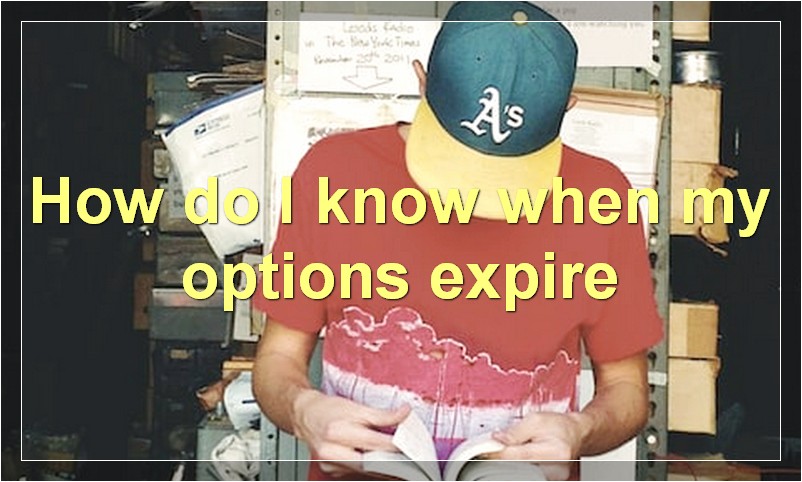Many people shy away from options trading because they believe it to be too complicated. However, options trading is not as complicated as it may seem at first glance. In fact, once you understand the basics, it can be a simple and effective way to trade.
What is an option expiry time
An option expiry time is the date and time at which an option contract expires and becomes void.
When trading options, it is important to be aware of the expiration date for your contracts. This is because once an option expires, it no longer has any value.
There are different types of expiration dates that you need to be aware of:
1. American style – this type of expiration allows you to exercise your option up until the expiration date.
2. European style – this type of expiration only allows you to exercise your option on the expiration date itself.
3. Flexible – this type of expiration gives you more flexibility as to when you can exercise your option.
Knowing the different types of expiration dates is important so that you can make sure you are trading the right type of contract for your needs.
What is the difference between an American and European option

An American option is an option that can be exercised at any time during the life of the option. A European option is an option that can only be exercised at the expiration date of the option.
What is the difference between a call and put option
When it comes to options, there are two primary types: calls and puts. Both options provide the holder with certain rights and the ability to take advantage of price movements in the underlying asset. The key difference between a call and put option lies in what each type of option contract gives the holder the right to do.
A call option provides the holder with the right to buy an underlying asset at a specified price, known as the strike price. Call options are often used as a way to speculate on future price movements of an asset, betting that the price will rise above the strike price. Put options, on the other hand, grant the holder the right to sell an underlying asset at the strike price. Put options are typically used as a way to hedge against potential downside price movements in an asset, or as a way to profit from falling prices.
What happens if I don’t sell my options before expiration
If you don’t sell your options before expiration, the options will expire and you will no longer have any rights associated with the options contract.
Can I exercise my option before expiration
Yes, you can exercise your option before expiration. Options give the holder the right to buy or sell a security at a set price within a certain time frame. The buyer of an option pays a premium to the seller for this right. If the market price of the security at expiration is above the strike price, the option will be in the money and the holder will exercise the option and buy or sell the security. If the market price is below the strike price, the option will be out of the money and will expire worthless.
How do I know when my options expire

If you’re like most people, you probably have some sort of investment account where you keep your money. This might be a savings account, a checking account, or even an account with a brokerage firm.
Within this account, you likely have different types of investments, including stocks, bonds, and mutual funds. Each of these has their own set of rules and regulations. For example, stocks are bought and sold on exchanges, while bonds are typically held to maturity.
Mutual funds are a bit different. They are managed by professionals who make decisions about where to invest the fund’s money. One of the key things they consider is the expiration date of the options within the fund.
The expiration date is important because it dictates when the option can be exercised. If you’re holding an option that expires in June, you can only exercise it in June. If the stock price is above the strike price at that time, you can buy the stock at the strike price. If the stock price is below the strike price, you don’t have to do anything.
However, if it’s July and the stock price is still above the strike price, you’re out of luck. The option has expired and can no longer be exercised.
This is why it’s important to pay attention to the expiration dates of your options. You don’t want to miss out on an opportunity to make money just because you forgot when the option expired.
What happens to my options if the underlying stock is acquired
If the underlying stock is acquired, the options may be void.
Are there any fees associated with options trading
The fees associated with options trading can vary depending on the broker you use and the type of options trade you enter. For example, buying options contracts typically costs less than selling them. In addition, some brokers may charge a per-contract fee for options trades, while others may charge a flat fee for all options trades regardless of how many contracts are bought or sold.
What is the riskiest type of options trade
When it comes to options trading, there is no such thing as a “risk-free” trade. Every trade carries with it some degree of risk, and the amount of risk will vary depending on the type of trade that is being made.
Some of the most common types of options trades are covered calls, naked puts, and credit spreads. Each of these trades carries with it a different level of risk, and it is important to understand the risks involved before entering into any trade.
A covered call is a type of options trade where the trader buys a stock and then sells a call option on that stock. The risk in this trade is limited to the price of the stock, and if the stock price goes down, the trader will still make money from the option premium.
A naked put is a type of options trade where the trader sells a put option without owning the underlying stock. The risk in this trade is unlimited, as the stock price could theoretically go to zero and the trader would still be obligated to buy the stock at the strike price.
A credit spread is a type of options trade where the trader sells a put option and buys a call option with a lower strike price. The risk in this trade is limited to the difference between the two strike prices, and if the stock price remains static or goes up, the trader will make money.
Options trading is not for everyone, and it is important to understand the risks involved before entering into any trade. However, for those who are willing to take on some risk, options trading can be a great way to make money.
What are some common strategies for trading options
Some common strategies for trading options include buying calls, buying puts, selling covered calls, and selling naked puts. Other less common strategies include buying straddles, selling straddles, and buying butterflies.

